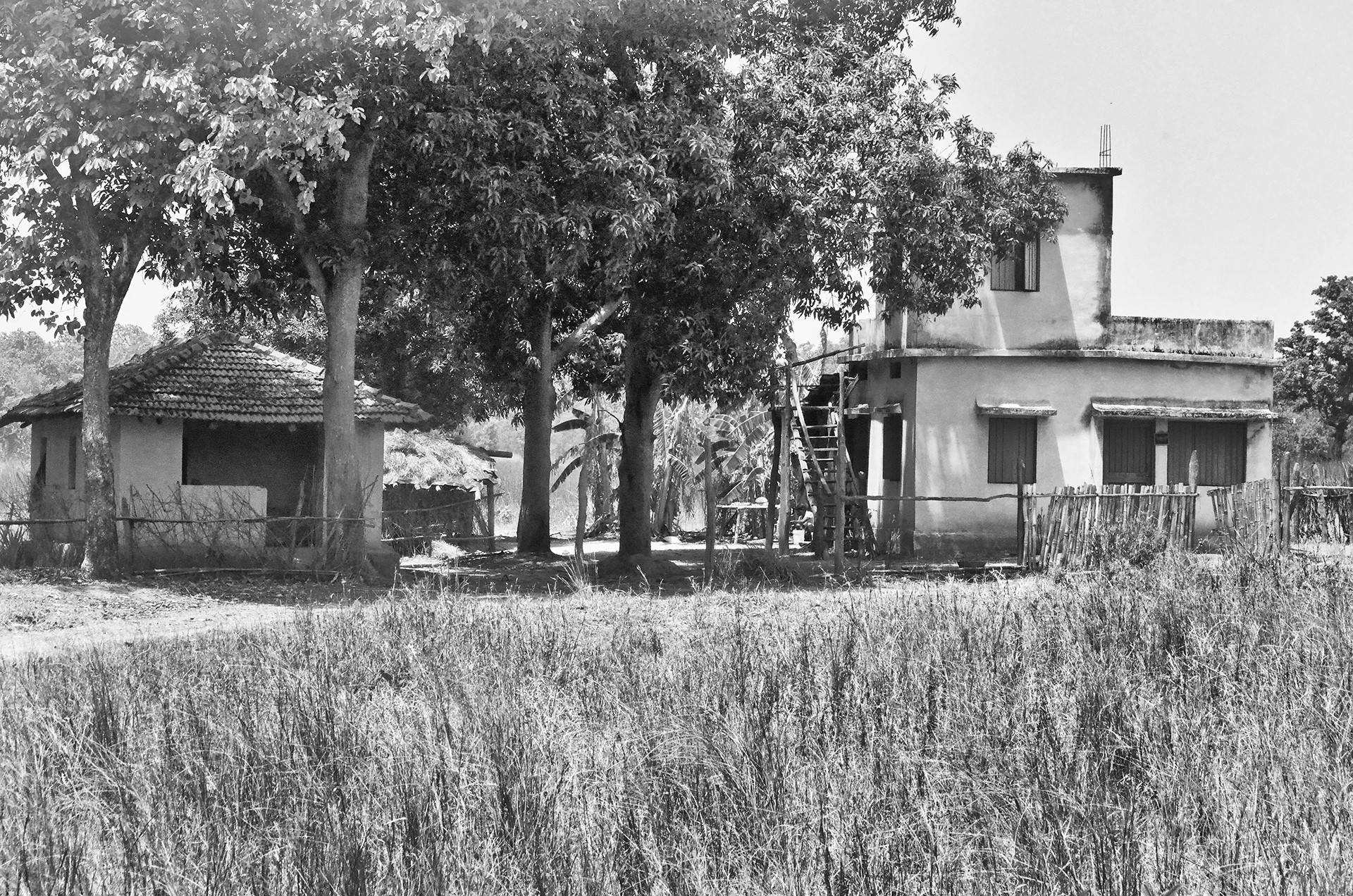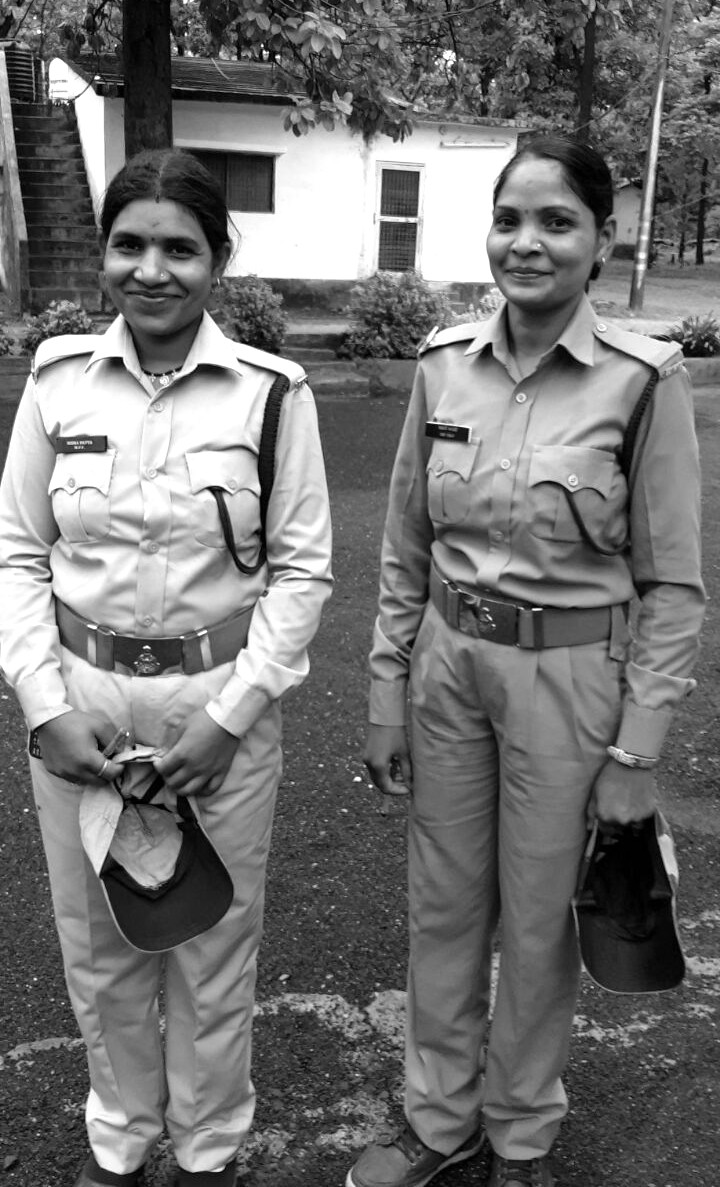I met Laxmi Maravi, a petite forest guard, at Kanha Tiger Reserve earlier this year. She was helping to conduct a Village Awareness programme run by Last Wilderness Foundation, the organisation where I work. The programme, developed in tandem with the Kanha forest department, is designed to address the issues faced by villagers living in the buffer zones around the reserve, and plays an important role in fostering a positive attitude towards conservation among local communities.
Laxmi is from a village called Ajhwaar, in the Dindori district. She is the first from her village to apply for the post of a forest guard, but there have been a few other women from Dindori who have joined the department.
It is not very common to see a female forest guard. The post is physically and mentally challenging – forest guards stay far away from their families, often staying alone at the forest chowki if required. They walk kilometres every day, patrolling in harsh terrains. In rural areas, most families are still reluctant to allow women to work outside of the home, let alone undertake an unconventional job like this.
In fact, Laxmi might never have followed this path into the forest if it wasn’t for the intervention of fate. She had wanted to join the police force, but as luck would have it, it was the exam for the forest guard posting that she cleared instead. Now, although she isn’t maintaining law and order in the chaotic urban jungle, she is helping with the upkeep of laws on the wilder side – the laws of the jungle. I was intrigued, and told Laxmi of my intentions to learn more about her life and experiences.
She looked at me wide-eyed, her puzzled face breaking into an infectious smile. She didn’t quite know what to make of someone wanting to write about a guard but when I told her how her work would inspire others, she shyly agreed to share her stories. So, we chatted over a glass of cold lemonade with the cicadas chiming in in the background – a summer orchestra in the wild.
Laxmi has been a forest guard at Kanha Tiger reserve for 12 years. After training as a forest guard in the ranger’s college at Balaghat for a year, she was posted at the Orai patrolling camp of Kanha Tiger Reserve, where she worked for one and a half months. “I knew nothing about wildlife at that point,” she said in Hindi. She was unsure about what the job would entail, and whether she would be able to carry out the tasks that would be expected of her.
“I used to wonder where to begin, till I received some guidance from my colleagues at the camp,” said Laxmi. Her colleagues taught her how to patrol the area, how to scan for any snares in her beat, how to clean the water holes, and how to record any tracks or signs of wildlife.
As she reminisced, she burst into a fit of giggles while describing her most memorable yet terrifying experiences from her first posting.
“Once, a python entered the camp while I was alone. I locked the camp door and ran out, and sat beside the camp well till help came. After gathering a few of my things from the camp, I half-ran, half-walked to my base at Mukki, which was almost 3km away,” she recounted.
She sipped her lemonade thoughtfully and shared another memory from her stay at the Orai camp. That evening too, she was alone at the camp, and the thought of the camp elephants, used by the guards to patrol their beats, suddenly storming into the compound to eat the banana trees planted there kept her awake at night. She said she braved the night by praying to the elephant god and lighting a lamp in his honour to keep the herd at bay.
Of course, after 12 years of working as a forest guard, she feels far more equipped now to handle these kinds of encounters.
In 2012, Laxmi was posted to the Adwar beat of Kanha. She recalled one time when she was attacked by a wild boar. “It was in July and it was drizzling. I had an umbrella that was big and heavy and difficult to manage, but it is probably the reason why I escaped unhurt,” she said. Laxmi was out on patrolling duty when a wild boar, probably startled by her presence, suddenly charged at her. “I sidestepped into some bushes, and fell to the ground, shoving the umbrella towards the boar to keep it from coming close to me,” she said. As the umbrella opened up, the legs of the animal got stuck in its spokes, and befuddled by the unintended trap, the boar grunted into the tangled design, giving her the chance to shout for help.
“When my colleagues saw me lying on the ground, they issued loud cries which drove the boar away, and I escaped with minor injuries,” she said. Later, she saw that there were wild boar piglets in the bushes, which had probably prompted their mother to attack.
I asked her to tell me about her encounters with the striped feline. Laxmi’s beat in Adwar spanned a vast 800 hectares, and she has only seen tigers on 2-3 occasions; that too, fleetingly. Her most memorable experience happened while she was patrolling the Adwar beat to check the condition of the water holes. One morning, walking with two of her colleagues past the Lanjiabehera Lake, she saw something shining in the sun.
As they drew closer, to a distance of around 150 meters, one of the guards whispered, “Tiger!” They had spotted the most magnificent male lounging next to the water. As the forest guards stood marvelling at the beauty of the animal, the cat got up slowly, lazily, and melted into the forest.
As I asked her to share more of her memorable experiences with me, I could almost hear her brain ticking, going back in time. Suddenly, her face lit up and she spoke of an old gaur who was a regular visitor to the Sarai Tola camp in the Adwar beat. “In the summer, we used to wait for the gaur to come to the camp. As it came towards us and stood there observing us, we would work the camp hand-pump to relieve it of its thirst. Once refreshed, it used to shake its horns in our direction as if thanking us,” she said. “I wonder if it’s still alive, she says, adjusting her watch thoughtfully.” It had been a year since she saw that old gaur, but she thought that she might see it again if she returned to Adwar, her old beat.
Over the past decade, Laxmi has learned a lot from the forest, about different seasons, and trees, and of course, about the animals it was home to. Perhaps the most important thing that she’s learned is that animals are never vicious, she said. Tigers, or any predators for that matter, won’t ever kill for greed, she pointed out. They hunt only when they’re hungry.
An encounter with two huge bears at the Baman Jhiriya water body was something that stayed with her too. Laxmi had been standing guard while her colleague was busy cleaning the lake of leaves one morning, when her eyes strayed to the edge of the lake. The water hole was surrounded by a dense thicket of mango trees, so it was difficult to see the bears until they were very close. And as bears are mostly nocturnal, she hadn’t been expecting to see them. “I spotted these two large shapes moving towards us. I was frozen. I managed to mutter, ‘Bhaiya, bhaloo’ to my unsuspecting colleague, and he threw his hands in the air shouting, ‘haat-haat’ to the bears,” she recounted. On seeing the hysterical humans, they could easily have attacked in defense, but instead the bears turned tail and raced back into the forest with screeches of “po po po”. “It was as if they were acknowledging the need for space between us and them,” she said.
Like any forest guard, Laxmi has many duties to perform within her jurisdiction. But one of the activities she enjoys the most is to observe and report the various floral changes in the trees with the changing seasons, like the sprouting of new buds, to the falling of leaves. Her favourite tree is the palaash. It bears flowers – bright, flaming red flowers – during the months of March to June, transforming the forest. It is a time she is especially fond of. One day, she said, she hopes to write about the various medicinal plants found in the Central highlands.
Before the conversation drew to a close, I asked her whether there has been opposition from her family on her being a woman working in the jungle – an unconventional profession for a woman in a rural setting. “Never!” she said firmly. “My family has supported me fully and they will continue doing so in the future as well.”
Laxmi told me that she has not faced any discrimination while working, either. In her view, her life as a forest guard has affirmed one thing: that protecting a forest has nothing to do with gender. What a man can do, a woman can too.



